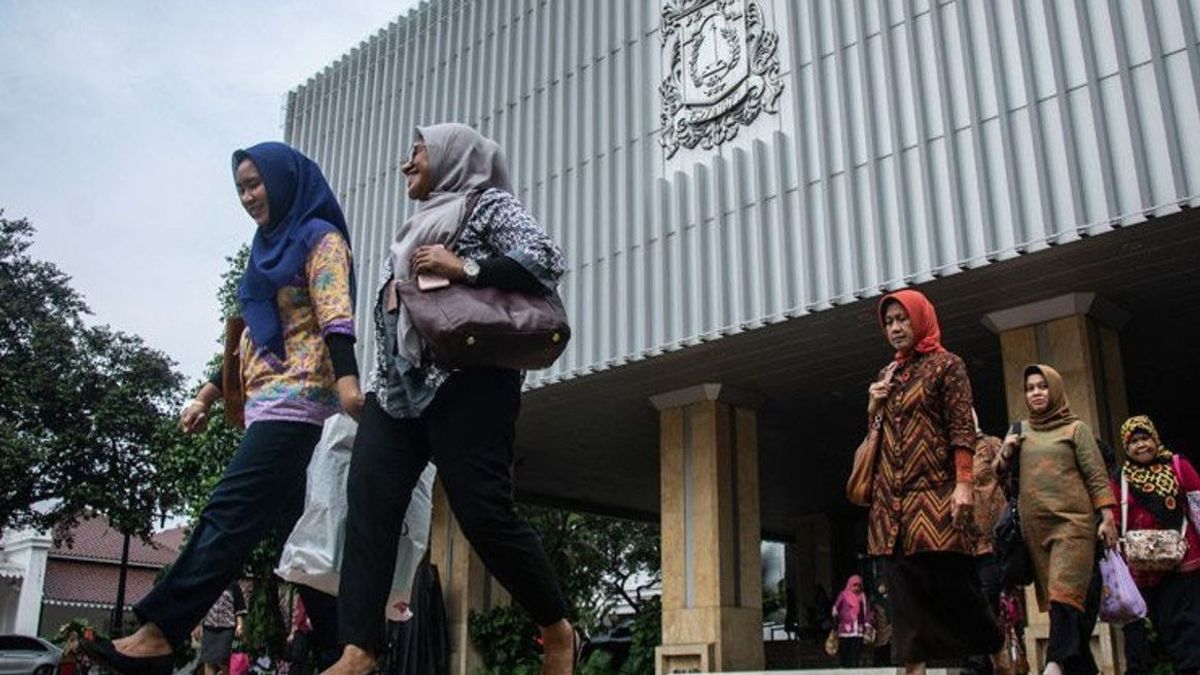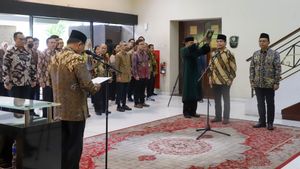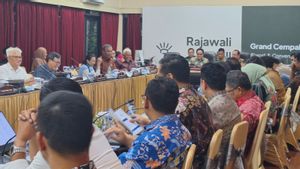
JAKARTA - If you want to register as a Civil Servant (PNS), it is better if you first learn the ins and outs of PNS, especially about career path and salary. Who knows, you might have a higher motivation to be accepted and reach a certain rank. Career paths are related to civil servants. Based on the Regulation of the Head of BKN Number 35 of 2011 concerning Guidelines for the Compilation of Careers for Civil Servants (PNS), it is stated that the rank of PNS is related.
Basically, civil servants consist of 4 rank groups, namely group 1 (I), group 2 (II), group 3 (III), and group IV. In each of these groups there are several ranks. When someone is accepted (for the first time) as a civil servant, that person will have a rank based on the last education that has been completed.
Group I is the lowest group in PNS, divided into groups Ia, Ib, Ic, and Id. Furthermore, there is group II which is divided into groups IIa, IIb, IIc, and IId. Then there is group III which is divided into groups IIIa, IIIb, IIIc, and IIId. The last is group IV. Group IV is divided into IVa, IVb, IVc, IVd, and IVe.
Each group of civil servants has an effect on the amount of basic salary and benefits received. In general, class I civil servants are civil servants with SD to SMP certificates. Class II civil servants are high school graduates to D3. Class III civil servants are graduates from S1 / D4 to S3. Class IV civil servants are arguably the pinnacle of a civil servant's career.
The civil servant category is related to the level of education, and this can change. For example, CPNS with high school diploma became civil servants for the first time as class IIa. Every 4 years, these civil servants have the opportunity to get a promotion to become class IIb, IIc, and IId. So, civil servants with high school certificates have the opportunity to pursue a career up to class III.
In addition, civil servants may take education to obtain a higher diploma. The last certificate can be applied for promotion with certain conditions. This path is usually taken with the aim of increasing the amount of salary earned. For more details, here is a list of civil servant groups.
1. Civil Servant Class I (Interpreter)
This civil servant group is a position that only requires basic skills — not yet required to master certain scientific skills. It is not surprising that usually class I civil servants are civil servants with SD and SMP diplomas. Civil servants group I are auxiliary executors of an activity. The responsibility of this group is to provide assistance to civil servants with higher ranks (Group II).
Group I (Interpreter)
Group He: Youth Juru
Class Ib: Junior Class I
Group Ic: Interpreter
Group 1d: Interpreters Level 1
2. Civil Servant Group II (Regulators)
Regulators are groups of civil servants who have skills in certain fields of knowledge and are technical in nature. The level of education for group II civil servants is SMA / equivalent to D-3. Class II civil servants or regulators are in charge of realizing operational activities.
Group II (Regulators)
Group IIa: Young regulators
Group IIb: Junior level I regulators
Group IIc: Regulators
Group IId: Level control 1
3. Civil Servant Category III (Administrators)
Administrators are a group of civil servants who require expertise in certain fields with a deep understanding. Class III civil servants have formal education of S-1 or D-4 to S-3. Civil servants with class III are responsible for ensuring the quality of a process and output (output) of regulatory work (class II).
Group III (Administrators)
Group IIIa: Young administrators
Group IIIb: Junior level I administrators
Group IIIc: Administrators
Group IIId: Administrators level 1
4. Civil servants Category IV (coach)
Group IV or coaches are civil servants who demand profound knowledge, maturity and wisdom during their tenure. Group IV is the highest rank as PNS. Civil servants group IV have the task of fostering and developing resources to realize the vision and mission of the institution.
Group IV (coach)
Group IVa: coach
Group IVb: coach level I
Group IVc: Young primary coaches
Group IVd Middle main coach
Group IVe: The main coach
Apart from the civil servant group, there is also echelonization. This is a structural hierarchy of positions in PNS. The following are civil servant echelon positions.
1. Echelon I
Echelon I is the regional leader. Echelon I is a civil servant with class IVc or IVe PNS. Echelon I is the highest structural position consisting of echelon Ia and echelon Ib. Echelon I's task is to set basic policies with the aim of achieving targets, both short and long term.
2. Echelon II
Echelon II is the head of the agency. Echelon II is a civil servant with the class IVc or IVd PNS. Echelon II is a second-tier structural position consisting of 2 ranges, namely Echelon IIa and Echelon IIb. The task of echelon II is planning and implementing strategies in developing the main policies of a region.
3. Echelon III
Echelon III is the head of the field or middle manager in a work unit. Echelon II is a civil servant with PNS IIId or IVd class. Echelon III is a third-tier structural position with 2 levels, namely Echelon IIIa and Echelon IIIb. Echelon III's task is the preparation and realization which is a derivative of the agency strategy prepared by Echelon II.
4. Echelon IV
Echelon IV is the section head or line manager in a work unit. Echelon IV is a civil servant with PNS IIIb or IIId class. Echelon IV is a fourth-tier structural position with 2 levels, namely Echelon IVa and Echelon IVb. Echelon IV's task is to be responsible for operational activities based on the programs prepared by Echelon III.
Salary for Civil Servant High School GraduatesCivil servants who graduate from high school will be included in group II. To illustrate the salary obtained by high school graduate civil servants, let's look at the salary of civil servants who are prison guards who are civil servants with high school diplomas.
• The basic salary for prison guards civil servants at the beginning of the working period is determined, one of which is by a certificate when registering as a CPNS. This is stated in the Regulation of the State Personnel Agency (BKN) Number 14 of 2018 concerning Technical Guidelines for the Procurement of Civil Servants. Based on these regulations, applicants for CPNS selection with high school certificates will be appointed as CPNS with IIa civil servants. Then, the amount of basic salary for high school graduates will vary, depending on the level of rank and length of service. Based on Government Regulation Number 15 of 2019 concerning the Eighteenth Amendment to Government Regulation Number 7 of 1977 concerning the Salary Regulations for Civil Servants, the basic salary for class IIa civil servants is detailed as follows, 0 year working period: Rp2,022,200, 1 year working period: Rp2. 054,100, 3-year service period: IDR 2,118,800, 5-year service period: IDR 2,185,500, etc.
• Performance allowances for civil servants guarding detainees are regulated in Regulation of the Minister of Law and Human Rights Number 33 of 2017. The value is adjusted to the class of office of the civil servant. Custodians are included in class 5, so the value of the performance allowance for civil servants in prison guards is IDR 3,134,250.
• There are still several types of civil servant benefits, but some are accompanied by certain conditions. One of the allowances is food allowance. Based on the Minister of Finance Regulation Number 78 of 2017, the allowance for food allowance for class I and II civil servants is IDR 35,000 / day. With the assumption of working 6 days a week, the value of the food allowance for civil servants in prison guards for a month is IDR 840,000. Thus, the total monthly salary for class IIa prison guards is IDR 5,996,450.
Salary for Civil Servants Graduates S1The main basis for civil servant payroll is Government Regulation Number 7 of 1977 (PP 7/1997) concerning the Salary Regulations for Civil Servants which then often undergo changes. Currently, the eighteenth amendment has been made, namely Government Regulation Number 15 of 2019. In this regulation, Article 3 paragraph 1 explains that civil servants are appointed and assigned to certain ranks.
As a supposition, an S-1 frash graduate will occupy the rank of young stylist or better known as class IIIa. Based on attachment II of Government Regulation Number 15 of 2019 concerning the Eighteenth Amendment to Government Regulation Number 7 of 1977, listed the value or amount of salary for class IIIa civil servants with a class (experience) of zero years of service of IDR 2,579,400.
The amount of the basic salary applies to all civil servants throughout the country, both at the central and regional levels. However, in PP 7/1997 CHAPTER IV concerning allowances, it is stated that a civil servant is entitled to receive an allowance which has various names and forms. The most common allowances are family allowances and performance allowances / job allowances / employee income allowances.
In general, fresh graduates S-! not married yet. Therefore, the family allowance (5%) is not included in the component of the salary received. The position allowance depends on the position occupied. In that section, each agency is different, the central government and local governments, because the value of the position allowance received by civil servants is regulated in the regulations of each local government / agency.
As an illustration, we use the mayoral regulation of one of the cities in East Java regarding additional civil servant salary (TPP) based on class of office published in 2017. Fresh graduates usually hold executive positions in Regional Government Organizations (OPD). The occupation classes range from grades 5 to 7. The value of the allowance earned — the median value — is IDR 1,500,000. The number of TPP usually takes into account the financial capacity of each region. If added together with the civil servant's basic salary, the total salary is IDR 2,579,400 + IDR 1,500,000 = IDR 4,0079,400.
Then, we will look at civil servant benefits in one of the central ministries / agencies (K / L) that are in the middle position in performance appraisal. For example, a fresh graduate who becomes a functional officer and becomes the first auditor is entitled to a performance allowance of IDR 4,522,500.00. If added together with the civil servant's basic salary, the value is IDR 2,579,400 + IDR 4,522,500 = IDR 7,101,900.
Apart from these two salary components, there are still several other allowances that will be received by fresh graduate S-1 civil servants or commonly referred to as other allowances, such as food allowances, for example. If you make an estimate, the salary earned by fresh graduate S-1 civil servants per month after being accumulated for a year is IDR 5.3 million (regional civil servants) and IDR 9.2 million (central PNS).
Civil Servant Working Period
• Overall Service Period (MKS)
In Kepka BKN No. 12/2002, it is stated that "The period of working as a civil servant continuously, which is meant in this provision, is the working period calculated from being appointed as a candidate for civil servant / civil servant until the person concerned dies or reaches the age limit. retirement and continuity as civil servants ”.
With these provisions, it is known that the working period of a civil servant is calculated from the time of appointment as a CPNS until the person dies or reaches the retirement age limit, provided that these civil servants carry out their duties continuously without interruption.
What matters then do not count as a civil servant's tenure? In Government Regulation Number 11 of 2017 Article 337 states, as long as civil servants take leave outside the state's responsibility, this is not counted as a civil servant's tenure. In addition, in Government Regulation Number 11 of 2017 Article 344 states that as long as they are state officials and leaders or members of non-structural institutions, this is not counted as a civil servant's tenure.
It is different when civil servants carry out learning tasks (tubel). Based on Presidential Regulation Number 12 of 1961 concerning Giving Learning Assignments, Article 8 states, the study period (tubel) is the period of service for civil servants to determine salary and as a retirement period, this will be calculated based on applicable regulations. For more details, here are the terms of service for civil servants that can be taken into account in determining the basic salary for civil servants.
• While being a CPNS / PNS, except during leave outside the state's responsibility.
• During his time as a state official, for example when he was a member of the legislature or governor.
• While carrying out government duties, such as
• become local staff at the representatives of the Republic of Indonesia abroad,
• become a non-permanent employee, for example a doctor's tenure while being a non-permanent employee,
• become village officials,
• become employees / personnel in international agencies,
• become an officer in another government whose income is borne by the State Budget (APBN).
• While carrying out obligations to defend the country, such as being a compulsory soldier and volunteer.
• During his time as employees of government-owned companies, such as BUMN and BUMD.
There is also a period of service for civil servants which is calculated with a value of ½, that is, the period of service as an employee / employee of a company with legal status outside the government agency that is not less than 1 year and not intermittent provided that the working period is calculated at most 8 years.
Civil servants who already have work experience in government agencies or private legal entities, who when they get a CPNS SK have not counted their work period as a civil servant or group, this can be reviewed and then adjusted to the civil servant's basic salary according to applicable regulations.
• Working Period (MKG)
Class working period (MKG) is the working period of civil servants in a certain class / space. MKG is usually used to calculate the amount or basic salary of civil servants. An increase in class and a decrease in class / rank are factors that greatly affect the amount of basic salary to be received by civil servants.
The English, Chinese, Japanese, Arabic, and French versions are automatically generated by the AI. So there may still be inaccuracies in translating, please always see Indonesian as our main language. (system supported by DigitalSiber.id)












